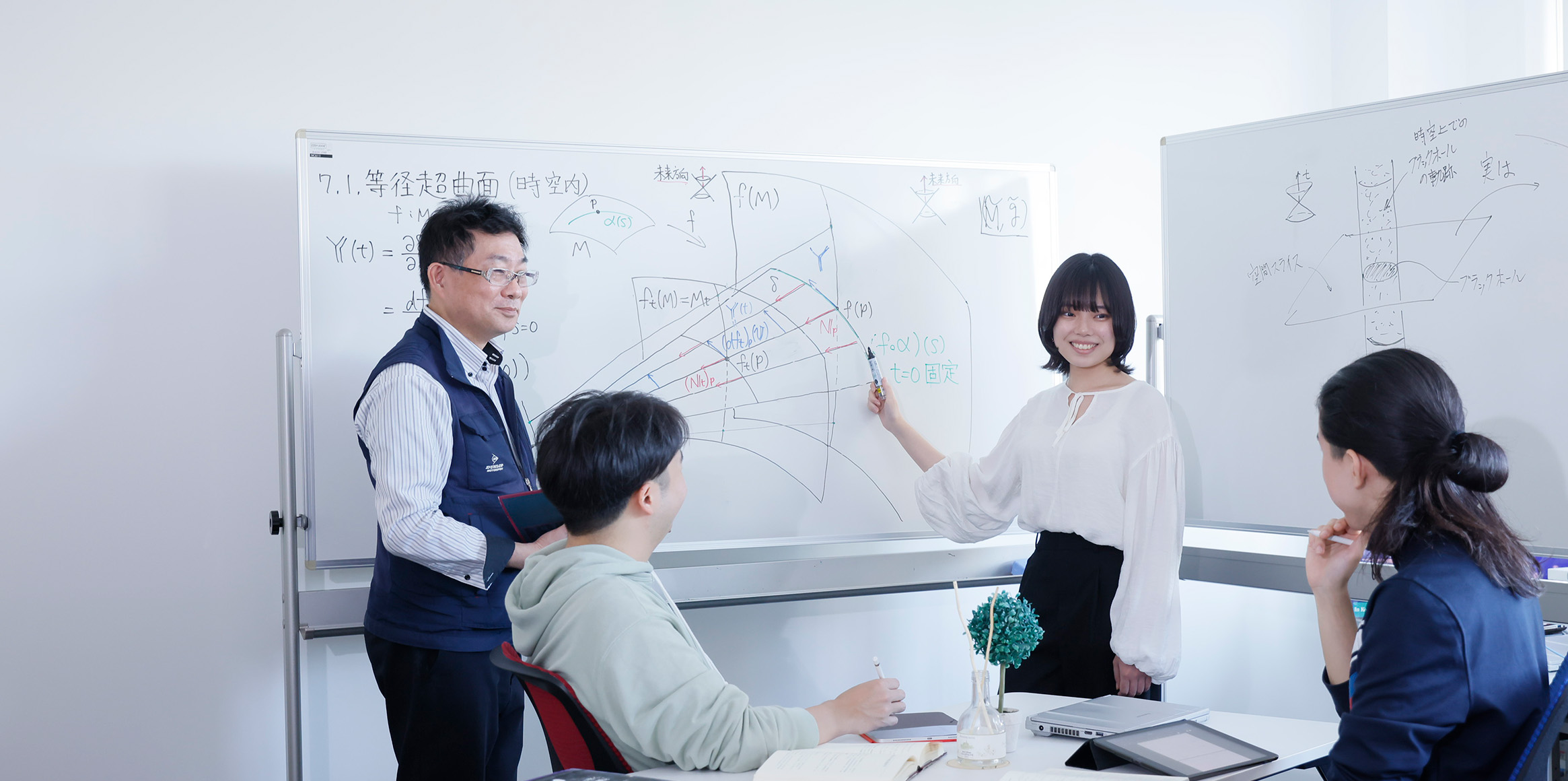The study of mathematics has a long history which extends far back into antiquity. However, research into mathematics does not proceed like an orderly set of integers; new eras bring new ideas and innovations. Mathematics is a living, deeply fascinating discipline which gives rise to novel and unexpected discoveries. Over the years, the Department of Mathematics has sent a great many math teachers out into society, and it offers a teacher training curriculum tailored to the needs of students interested in a teaching career. In response to the rapid growth of computer and information-related industries in recent years, the Department has also been augmenting its educational curriculum to help students cultivate the sort of quick adaptability necessary for success in the business world.
Research Groups & Research Areas
-
Algebra
The origins of algebra lie in the study of numbers, with its development coming from abstraction in the study of arithmetic sets. Algebra is the foundation of such research areas as group theory, ring theory and organization theory, which it continues to impact and be impacted by today.
Kida Research Group / Kunugi Research Group / Yoshikawa Research Group
-
Geometry
Modern geometry is divided into a variety of fields, including differential geometry, which makes use of calculus, complex geometry, which deals with the world of complex numbers, and topology, which deals with soft shapes, and it continues to develop today while being influenced by theoretical physics.
Koike Research Group / Oyamaguchi Research Group / Yamakawa Research Group
-
Analysis
The beginnings of analysis can be found with Archimedes, but it was after the birth of calculus in the 17th century that this area fully developed. Today, calculus is used to solve various problems, and is applied in a wider field than normal functions.
Kato Research Group / Ohta Research Group / Tanaka Research Group / Yokota Research Group
-
Probability Theory / Statistics
Even if a phenomenon appears to be chaotic at first glance, some regularity may be found if it occurs for many times, and this can be used for surveys and forecasts. Further, for Brownian motion and the like, which are constantly subjected to a chaotic force, we can find regularities from equations.
Kaneko Research Group
-
Mathematics Education
We all studied mathematics at elementary, junior high, and high school. Considering historical transformations and the current status quo of content and teaching methods, as well as ways of evaluating the curriculum in mathematics, we try to envision the shape of mathematics education in the future.
Nakagawa Research Group
List of Faculty Members
| Name | Title | Research Area | Keyword |
|---|---|---|---|
| KATO Keiichi | Professor | Basic analysis | partial differential equation |
| KIDA Masanari | Professor | Algebra | Number theory |
| KOIKE Naoyuki | Professor | Geometry | Differential Geometry |
| KUNUGI Naoko | Professor | Algebra | Representations of finite groups |
| NAKAGAWA Hiroyuki | Professor | Science education | Mathematical Education |
| OHTA Masahito | Professor | Mathematical analysis | Nonlinear Partial Differential Equations |
| YOKOTA Tomomi | Professor | Basic analysis | Partial differential equations |
| OYAMAGUCHI Natsumi | Associate Professor | Geometry | |
| SUGIYAMA Yuusuke | Associate Professor | Mathematical analysis | theory of partial differential equations |
| TANAKA Mieko | Associate Professor | Mathematical analysis | |
| YAMAKAWA Daisuke | Associate Professor | Geometry | Symplectic Geometry, Algebraic Geometry |
| YOSHIKAWA Sho | Junior Associate Professor | Algebra | Number theory |
| CHIYO Yutaro | Assistant Professor | Basic analysis | |
| FUJII Tomoki | Assistant Professor | Geometry | Differential Geometry |
| KAJIGAYA Toru | Assistant Professor | Geometry | Differential geometry |
| KATAYAMA Yuta | Assistant Professor | Algebra | Number Theory |
| KURIMA Shunsuke | Assistant Professor | Basic analysis | Nonlinear partial differential equations |
| MURAMATSU Ryo | Assistant Professor | Mathematical analysis | |
| OSADA Yuki | Assistant Professor | Mathematical analysis | variational method, nonlinear elliptic partial differential equation |
| SUZUKI Kyoichi | Assistant Professor | Algebra | Representation theory of finite groups |
Information on Career Paths
-
Graduate School44.0%
-
Information Industry14.0%
-
Education, Learning Support13.0%
-
Finance, Insurance9.0%
-
Professional and Technical Services4.0%
-
Miscellaneous Services3.0%
-
Machinery and Appliances2.0%
-
Civil Servant2.0%
-
Real Estate and Goods Rental and Leasing2.0%
-
Other(Persons Planning on Continuing Education, Studying Abroad, etc.)7.0%

